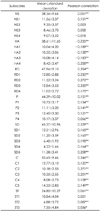Abstract
Objectives
In previous studies, both temperament and character were known as an important factor to determine the extent of social support. The purpose of this study was to evaluate effects of temperament and character on social support.
Methods
A total 4329 participants completed questionnaires, which included Lubben Social Network Scale (LSNS), Temperament and Character Inventory (TCI). This study used Pearson's correlation to evaluate the correlation between TCI dimensions and LSNS. To find the most influential TCI dimension for LSNS, multiple regression analysis was performed for this study.
Results
TCI dimensions showed significant mean differences depending on gender (p<0.001). LSNS had highest positive correlation with reward dependence (r=0.357, p<0.001). Three dimensions of TCI (Persistence, Self-Directedness, Cooperativeness) had positive correlation with LSNS (p<0.001). Harm avoidance had negative correlation with LSNS (r=-0.237, p<0.001). According to the results of the multiple regression analysis, reward dependence is the most influential TCI dimension (β=0.261, t=15.963, p<0.001).
Figures and Tables
References
2. Huang MF, Yen CF, Lung FW. Moderators and mediators among panic, agoraphobia symptoms, and suicidal ideation in patients with panic disorder. Compr Psychiatry. 2010. 51:243–249.

3. Norman RM, Malla AK, Manchanda R, Harricharan R, Takhar J, Northcott S. Social support and three-year symptom and admission outcomes for first episode psychosis. Schizophr Res. 2005. 80:227–234.

4. Cohen S, Wills TA. Stress, social support, and the buffering hypothesis. Psychol Bull. 1985. 98:310–357.

5. Terry DJ, Rawle R, Callan VJ. The effects of social support on adjustment to stress: the mediating role of coping. Pers Relatsh. 1995. 2:97–124.

6. Thoits PA. Stress, coping, and social support processes: where are we? What next? J Health Soc Behav. 1995. Spec No:53–79.

7. Hobfoll SE, Walfisch S. Coping with a threat to life: a longitudinal study of self-concept, social support, and psychological distress. Am J Community Psychol. 1984. 12:87–100.

8. Pietrzak RH, Johnson DC, Goldstein MB, Malley JC, Southwick SM. Psychological resilience and postdeployment social support protect against traumatic stress and depressive symptoms in soldiers returning from Operations Enduring Freedom and Iraqi Freedom. Depress Anxiety. 2009. 26:745–751.

9. Kaplan HI, Sadock BJ. Kaplan and Sadock's Synopsis of psychiatry. 2007. 10th ed. United States: Lippincott Williams & Wilkins;896–899.
10. Uchino BN. Understanding the links between social support and physical health a lifespan perspective with emphasis on the separability of perceived and received support. Perspect Psychol Sci. 2009. 4:236–255.

11. Tsouna-Hadjis E, Vemmos KN, Zakopoulos N, Stamatelopoulos S. First-stroke recovery process: the role of family social support. Arch Phys Med Rehabil. 2000. 81:881–887.

12. Tomaka J, Thompson S, Palacios R. The relation of social isolation, loneliness, and social support to disease outcomes among the elderly. J Aging Health. 2006. 18:359–384.

13. Monroe SM, Steiner SC. Social support and psychopathology: interrelations with preexisting disorder, stress, and personality. J Abnorm Psychol. 1986. 95:29–39.

14. Gracia E, Musitu G. Social isolation from communities and child maltreatment: a cross-cultural comparison. Child Abuse Negl. 2003. 27:153–168.

15. Cloninger CR, Svrakic DM, Przybeck TR. A psychobiological model of temperament and character. Arch Gen Psychiatry. 1993. 50:975–990.

16. Kitamura T, Kijima N, Watanabe K, Takezaki Y, Tanaka E. Precedents of perceived social support: personality and early life experiences. Psychiatry Clin Neurosci. 1999. 53:649–654.

17. Ghazinour M, Richter J, Eisemann M. Personality related to coping and social support among Iranian refugees in Sweden. J Nerv Ment Dis. 2003. 191:595–603.

18. Taylor SE, Sherman DK, Kim HS, Jarcho J, Takagi K, Dunagan MS. Culture and social support: who seeks it and why? J Pers Soc Psychol. 2004. 87:354–362.

19. De Fruyt F, Van De Wiele L, Van Heeringen C. Cloninger's psychobiological model of temperament and character and the five-factor model of personality. Pers Individ Dif. 2000. 29:441–452.

20. Tomita T, Aoyama H, Kitamura T, Sekiguchi C, Murai T, Matsuda T. Factor structure of psychobiological seven-factor model of personality: a model-revision. Pers Individ Dif. 2000. 29:709–727.

21. Hansenne M, Reggers J, Pinto E, Kjiri K, Ajamier A, Ansseau M. Temperament and character inventory (TCI) and depression. J Psychiatr Res. 1999. 33:31–36.

22. Min BB, Oh HS, Lee JY. Manual of temperament and character inventory. 2007. Seoul, Korea: Maumsarang;15–44.
23. Lubben JE. Assessing social networks among elderly populations. Fam Community Health. 1988. 11:42–52.

24. Lee KW, Kim SY, Chung W, Hwang GS, Hwang YW, Hwang IH. The validity and reliability of Korean version of lubben social network scale. Korean J Fam Med. 2009. 30:352–358.

25. Davydov DM, Stewart R, Ritchie K, Chaudieu I. Resilience and mental health. Clin Psychol Rev. 2010. 30:479–495.

26. Ball S, Smolin J, Shekhar A. A psychobiological approach to personality: examination within anxious outpatients. J Psychiatr Res. 2002. 36:97–103.

27. Naito M, Kijima N, Kitamura T. Temperament and Character Inventory (TCI) as predictors of depression among Japanese college students. J Clin Psychol. 2000. 56:1579–1585.

28. Yuh J, Neiderhiser JM, Spotts EL, Pedersen NL, Lichtenstein P, Hansson K, et al. The role of temperament and social support in depressive symptoms: a twin study of mid-aged women. J Affect Disord. 2008. 106:99–105.





 PDF
PDF ePub
ePub Citation
Citation Print
Print






 XML Download
XML Download